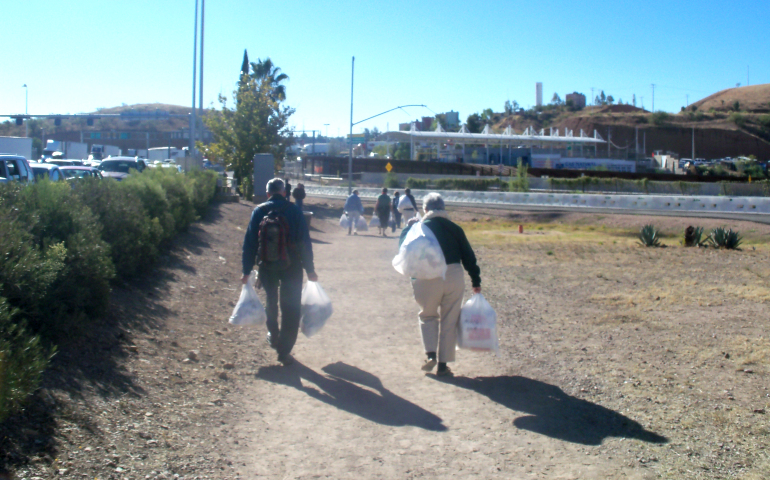
Loretto members carry socks and medical supplies across the border to Casa Nazareth in Nogales, Mexico, on a previous trip. (Mary Ann McGivern)
I'm traveling to Tucson April 26 to visit some of the groups that work on our border with Mexico. The trip is organized by the Loretto Community Latin American/Caribbean Committee, which has been leading groups a couple of times a year for a dozen years. I went once before, when many migrants were stranded on the Mexican side. We delivered socks and washed and bandaged people's feet.
This time the migrants are fewer. Nonetheless, Easter Sunday's front page article in the Los Angeles Times was on a Honduran 19-year-old riding the train they call "La Bestia" to get to a new life in the United States. The story takes place in Nogales, Mexico, where we will be going. The migrant, Besser Geovanny Zelaya Ortiz, says that he will not give up and will keep moving forward. His mom and brothers and sisters need his help.
We will be visiting one of the places that helped Zelaya, El Comedor, the dining room. It's a concrete-block room with tables and benches that serves meals to migrants on their way to the U.S. and to those just returned to Mexico by Immigration and Customs Enforcement. The group No More Deaths maintains a map of the border on the back wall of El Comedor showing where people have died crossing the desert.
Our little group of 11 will be carrying white socks, toiletries for men and women, first aid supplies, baseball caps, backpacks, long-sleeved shirts to protect from sun, children's school supplies, art supplies and cash and checks. The money and goods will go to the Kino Initiative for El Comedor and Nazareth House, which offers shelter; Home of Hope and Peace, which builds community in Nogales, Mexico, as an alternative to crossing the desert; No More Deaths; Humane Borders; and Tucson's Southside Presbyterian Church, which has provided tireless leadership for 40 years.
Humane Borders will take us with them on their water run on early Thursday (April 27) morning. They are motivated by faith and kindness to deliver water in the Sonora Desert. A couple of times a week, they take a truck out to fill big blue barrels they've stationed along migration paths. Here's the rest of the schedule:
1 p.m. - Operation Streamline; Tucson Federal Court
4 p.m. - Meet with Sarah Roberts, elder of South Side Presbyterian Church
6 p.m. - Mexican dinner near El Tiradito Shrine where Tucson activists have met every Thursday evening for the last three years to pray for those who have died in the desert and for those who are trying to cross. (We will join them at 7 for their gathering.)
Home - Debriefing
Friday, April 28
Blessing for our day and trip to the border
6:45 a.m. - Load cars or van
8:30 a.m. - Cross border
9 a.m. - El Comedor; help serve breakfast to deportees and visit Casa Nazareth
Noon - Join children and volunteers at Home of Hope and Peace for lunch and a presentation from the director.
Home - Supper and debriefing
Saturday, April 29
Day - Meet with No More Deaths and help deliver water and food to the desert trail
Saturday night - Pizza, spirits and debriefing
The Loretto Community Latin American/Caribbean Committee does these border trips not only to educate ourselves, the Loretto Community, and the wider community, but also to support the many hundreds of volunteers working in these border towns. Many of these volunteers are just like us in age and in dedication to justice. I'm making this second trip so that I will be able to assist committee members in leading these visits.
The experience is very full but nothing compared to the trek across the desert.




